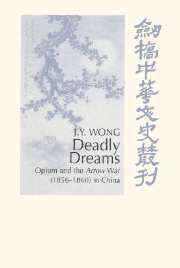Book contents
- Frontmatter
- Contents
- List of Tables
- List of Figures
- Poem by the late Mr Qin Esheng
- Foreword by Professor Wang Gungwu
- Foreword by Professor C. A. Bayly
- Preface
- Part I The confusion of imperialism
- Part II The pretext for imperialism
- Part III The personalities of imperialism
- Part IV The rhetoric of imperialism
- 7 Marx, Punch, and a political press: The debate among the British newspapers
- 8 The Arrow incident and international law: The debate in the House of Lords
- 9 Triumph of the liberal conscience: The debate in the House of Commons
- 10 ‘Johnny’ is on his knees: The ‘Chinese Election’
- Part V The mechanics of imperialism
- Part VI The economics of imperialism
- Part VII The dynamics of imperialism
- Chronology of major events
- Word list
- Abbreviations
- Bibliography
- Index
10 - ‘Johnny’ is on his knees: The ‘Chinese Election’
Published online by Cambridge University Press: 29 September 2009
- Frontmatter
- Contents
- List of Tables
- List of Figures
- Poem by the late Mr Qin Esheng
- Foreword by Professor Wang Gungwu
- Foreword by Professor C. A. Bayly
- Preface
- Part I The confusion of imperialism
- Part II The pretext for imperialism
- Part III The personalities of imperialism
- Part IV The rhetoric of imperialism
- 7 Marx, Punch, and a political press: The debate among the British newspapers
- 8 The Arrow incident and international law: The debate in the House of Lords
- 9 Triumph of the liberal conscience: The debate in the House of Commons
- 10 ‘Johnny’ is on his knees: The ‘Chinese Election’
- Part V The mechanics of imperialism
- Part VI The economics of imperialism
- Part VII The dynamics of imperialism
- Chronology of major events
- Word list
- Abbreviations
- Bibliography
- Index
Summary
I. George Cruikshank wields his pen
‘Twas honest English, ‘Ayes’ and ‘Noes’
That won a vote in former day,
Till Peace-at-any-price arose,
And, sympathising with our foes,
Obtain'd it –Quaker-like –for Yeh
Palmerston's defeat over Cobden's motion goaded a Dr W. Gourley to write immediately to the Foreign Office: I hope the Ministry have not resigned, but whether they have or not I am determined to do what I can’, he declared, ‘to dispel the delusion under which a very large portion of the public are at present labouring through the speech of Mr Cobden and others’.
Apparently he had access to some sketches of the horrible and barbarous punishments the Chinese officials inflicted upon their own people. He would send these sketches to his friend, George Cruikshank, ‘the first artist in Europe’ –indeed a great draughtsman –with a request that he would put all else aside and reproduce the sketches in his own peculiar style ‘to be hung up in every picture shop of any note in the metropolis’.
He was confident that these reproduced sketches would do more to enlist the sympathy of the public in favour of the ministry than all the speeches that could be delivered in or out of Parliament. What made him so sure? George Cruikshan's ‘matchless delineation of the horrors of drunken-ness have done more for the cause of Temperance in this country and in America’, he claimed, ‘than all the lectures that have ever been delivered upon that subject’.
- Type
- Chapter
- Information
- Deadly DreamsOpium and the Arrow War (1856–1860) in China, pp. 216 - 258Publisher: Cambridge University PressPrint publication year: 1998



